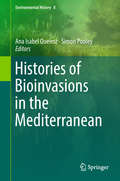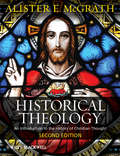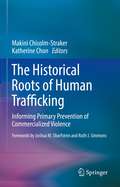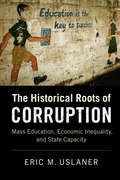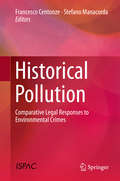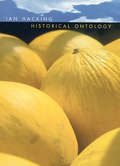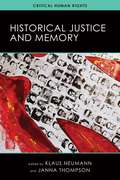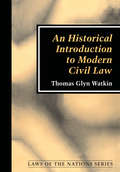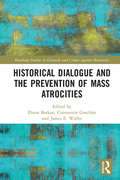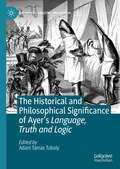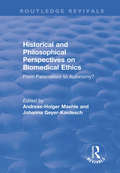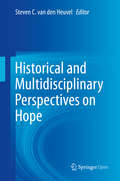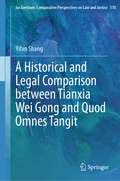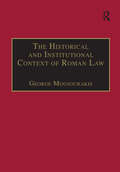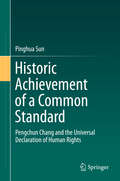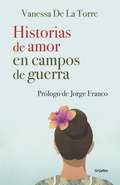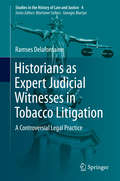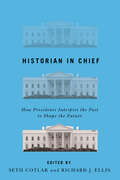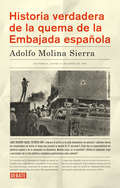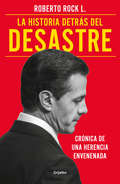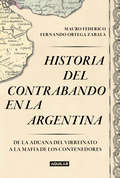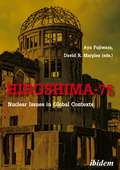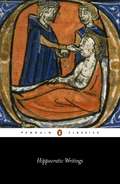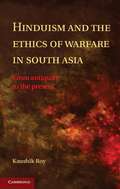- Table View
- List View
Histories of Bioinvasions in the Mediterranean (Environmental History Ser. #8)
by Ana Isabel Queiroz Simon PooleyBioinvasions is a current top research subject for natural sciences, social sciences and humanities and a major concern for conservationists, land managers and planners. In the last decades, new findings, perspectives and practices have revealed the multifaceted challenges of preventing new introductions and dealing with those invasive species that harm natural ecosystems, economy and human welfare. This book brings together environmental historians and natural scientists to share their studies and experiences on the human dimensions of biological invasions from the ancient past to the current challenges. The collection of papers focuses on the Mediterranean region and deals with aquatic and terrestrial ecosystems on the mainland and islands, ranging from marine and freshwater environments to coastal marshlands and forests. A wide diversity of animals and plants are featured, from marine fishes to marine and freshwater crustaceans, invertebrates, reptiles and amphibians, birds and mammals, to grasses, shrubs and trees. This book is a contribution to the scientific debate on how to deal with the historical dimensions of biological invasions, fostering dialogue between cultural and ecological explanations of environmental change, to inform environmental policy and management. It has been organized in three sections: the first is the editors’ introduction, in which they review the existing literature and highlight relevant concepts and ideas; the second is about alien species in the Mediterranean region; the third includes cases from other Mediterranean-type regions.
Historical Theology
by Alister E. McgrathFreshly updated for this second edition with considerable new material, this authoritative introduction to the history of Christian theology covers its development from the beginnings of the Patristic period just decades after Jesus's ministry, through to contemporary theological trends. A substantially updated new edition of this popular textbook exploring the entire history of Christian thought, written by the bestselling author and internationally-renowned theologian Features additional coverage of orthodox theology, the Holy Spirit, and medieval mysticism, alongside new sections on liberation, feminist, and Latino theologies, and on the global spread of Christianity Accessibly structured into four sections covering the Patristic period, the Middle Ages and Renaissance, the reformation and post-reformation eras, and the modern period spanning 1750 to the present day, addressing the key issues and people in each Includes case studies and primary readings at the end of each section, alongside comprehensive glossaries of key theologians, developments, and terminology Supported by additional resources available on publication at www. wiley. com/go/mcgrath
The Historical Roots of Human Trafficking: Informing Primary Prevention of Commercialized Violence
by Makini Chisolm-Straker Katherine ChonA public health approach to human trafficking requires a nuanced understanding of its root causes. This textbook applies a historical lens to human trafficking from expert resources for the multidisciplinary public health learner and worker. The book challenges the anti-trafficking paradigm to meaningfully understand historical legacies of present-day root-causes of human trafficking. This textbook focuses on history’s utility in public health. It describes history to contextualize and explain present times, and provides public health lessons in trafficking prevention and intervention. Public health recognizes the importance of multiple systems to solve big problems, so the chapters illustrate how current anti-trafficking efforts in markets and public systems connect with historical policies and data in the United States. Topics explored include:Capitalism, Colonialism, and Imperialism: Roots for Present-Day Trafficking Invisibility, Forced Labor, and Domestic Work Addressing Modern Slavery in Global Supply Chains: The Role of Businesses Immigration, Precarity, and Human Trafficking: Histories and Legacies of Asian American Racial Exclusion in the United StatesSystemic and Structural Roots of Child Sex Trafficking: The Role of Gender, Race, and Sexual Orientation in Disproportionate VictimizationThe Complexities of Complex Trauma: An Historical and Contemporary Review of Healing in the Aftermath of Commercialized Violence Historical Context Matters: Health Research, Health Care, and Bodies of Color in the United States Understanding linkages between contemporary manifestations of human trafficking with their respective historical roots offers meaningful insights into the roles of public policies, institutions, cultural beliefs, and socioeconomic norms in commercialized violence. The textbook identifies sustainable solutions to prevent human trafficking and improve the health of the Nation.The Historical Roots of Human Trafficking is essential reading for students of public health, health sciences, criminology, and social sciences; public health professionals; academics; anti-trafficking advocates, policy-makers, taskforces, funders, and organizations; legislators; and governmental agencies and administrators.
The Historical Roots of Corruption: Mass Education, Economic Inequality, and State Capacity
by Eric M. UslanerWhy does corruption persist over long periods of time? Why is it so difficult to eliminate? Suggesting that corruption is deeply rooted in the underlying social and historical political structures of a country, Uslaner observes that there is a powerful statistical relationship between levels of mass education in 1870 and corruption levels in 2010 across 78 countries. He argues that an early introduction of universal education is shown to be linked to levels of economic equality and to efforts to increase state capacity. Societies with more equal education gave citizens more opportunities and power for opposing corruption, whilst the need for increased state capacity was a strong motivation for the introduction of universal education in many countries. Evidence for this argument is presented from statistical models, case studies from Northern and Southern Europe, Asia, Africa, Latin America, the United States, Canada, Australia, and New Zealand, as well as a discussions of how some countries escaped the 'trap' of corruption.
Historical Pollution
by Francesco Centonze Stefano ManacordaThis volume examines legal matters regarding the prevention and fighting of historical pollution caused by industrial emissions. "Historical pollution" refers to the long-term or delayed onset effects of environmental crimes such as groundwater or soil pollution. Historical Pollution presents and compares national legal approaches, including the most interesting and effective mechanisms for managing environmental problems in relation with historical pollution. It features interdisciplinary and international comparisons of traditional and alternative justice mechanisms. This book will be of interest to researchers in criminology and criminal justice and related areas, such as politics, law, and economics, those in the public and private sectors dealing with environmental protection, including international institutions, corporations, specialized national agencies, those involved in the criminal justice system, and policymakers.
Historical Ontology
by Ian HackingWith the unusual clarity, distinctive and engaging style, and penetrating insight that have drawn such a wide range of readers to his work, Ian Hacking here offers his reflections on the philosophical uses of history. The focus of this volume, which collects both recent and now-classic essays, is the historical emergence of concepts and objects, through new uses of words and sentences in specific settings, and new patterns or styles of reasoning within those sentences. In its lucid and thoroughgoing look at the historical dimension of concepts, the book is at once a systematic formulation of Hacking's approach and its relation to other types of intellectual history, and a valuable contribution to philosophical understanding. Hacking opens the volume with an extended meditation on the philosophical significance of history. The importance of Michel Foucault--for the development of this theme, and for Hacking's own work in intellectual history--emerges in the following chapters, which place Hacking's classic essays on Foucault within the wider context of general reflections on historical methodology. Against this background, Hacking then develops ideas about how language, styles of reasoning, and "psychological" phenomena figure in the articulation of concepts--and in the very prospect of doing philosophy as historical ontology.
Historical Justice and Memory
by Klaus Neumann Janna ThompsonHistorical Justice and Memory highlights the global movement for historical justice--acknowledging and redressing historic wrongs--as one of the most significant moral and social developments of our times. Such historic wrongs include acts of genocide, slavery, systems of apartheid, the systematic persecution of presumed enemies of the state, colonialism, and the oppression of or discrimination against ethnic or religious minorities. The historical justice movement has inspired the spread of truth and reconciliation processes around the world and has pushed governments to make reparations and apologies for past wrongs. It has changed the public understanding of justice and the role of memory. In this book, leading scholars in philosophy, history, political science, and semiotics offer new essays that discuss and assess these momentous global developments. They evaluate the strength and weaknesses of the movement, its accomplishments and failings, its philosophical assumptions and social preconditions, and its prospects for the future.
An Historical Introduction to Modern Civil Law (Laws of the Nations Series #3)
by Thomas Glyn WatkinThe civil law systems of continental Europe, Latin America and other parts of the world, including Japan, share a common legal heritage derived from Roman law. However, it is an inheritance which has been modified and adapted over the centuries as a result of contact with Germanic legal concepts, the work of jurists in the mediaeval universities, the growth of the canon law of the western Church, the humanist scholarship of the Renaissance and the rationalism of the natural lawyers of the seventeenth and eighteenth centuries. This volume provides a critical appreciation of modern civilian systems by examining current rules and structures in the context of their 2,500 year development. It is not a narrative history of civil law, but an historical examination of the forces and influences which have shaped the form and the content of modern codes, as well as the legislative and judicial processes by which they are created are administered.
Historical Dialogue and the Prevention of Mass Atrocities (Routledge Studies in Genocide and Crimes against Humanity)
by Elazar Barkan Constantin Goschler James E. WallerThis book brings together a diverse range of international voices from academia, policymaking and civil society to address the failure to connect historical dialogue with atrocity prevention discourse and provide insight into how conflict histories and historical memory act as dynamic forces, actively facilitating or deterring current and future conflict. Established on a variety of international case studies combining theoretical and practical points of view, the book envisions an integrated understanding of how historical dialogue can inform policy, education, and the practice of atrocity prevention. In doing so, it provides a vital basis for the development of preventive policies sensitive to the importance of conflict histories and for further academic study on the topic. It will be of interest to all scholars and students of history, psychology, peace studies, international relations and political science.
The Historical and Philosophical Significance of Ayer’s Language, Truth and Logic (History of Analytic Philosophy)
by Adam Tamas TubolyThis edited collection provides the first comprehensive volume on A. J. Ayer’s 1936 masterpiece, Language, Truth and Logic. With eleven original chapters the volume reconsiders the historical and philosophical significance of Ayer’s work, examining its place in the history of analytic philosophy and its subsequent legacy. Making use of pioneering research in logical empiricism, the contributors explore a wide variety of topics, from ethics, values and religion, to truth, epistemology and philosophy of language. Among the questions discussed are: How did Ayer preserve or distort the views and conceptions of logical empiricists? How are Ayer's arguments different from the ones he aimed at reconstructing? And which aspects of the book were responsible for its immense impact? The volume expertly places Language, Truth and Logic in the intellectual and socio-cultural history of twentieth-century philosophical thought, providing both introductory and contextual chapters, as well as specific explorations of a variety of topics covering the main themes of the book. Providing important insights of both historical and contemporary significance, this collection is an essential resource for scholars interested in the legacy of the Vienna Circle and its effect on ethics and philosophy of mind.
Historical and Philosophical Perspectives on Biomedical Ethics: From Paternalism to Autonomy? (Routledge Revivals)
by Andreas-Holger Maehle Johanna Geyer-KordeschThis title was first published in 2002: This volume discusses the subject of biomedical ethics. Various views, historical and contemporary, are discussed, with the editors using the contrasting concepts in the shift from paternalism to autonomy in 20th-century medicine as a heuristic tool for the critical study of ethics in medicine.As far as the evidence in this volume goes, paternalistic medical practices and patient autonomy had an uneasy relationship by the beginning of the 20th century. A hundred years later, full autonomy in decisions on medical treatment is still subject to numerous caveats. The text pays close attention to the interplay between various players, noting how factors such as social contexts, governmental organizations and the biotechnological industry influence and shape responses to the principle of bioethics.
Historical and Multidisciplinary Perspectives on Hope
by Steven C. van den HeuvelThis open access volume makes an important contribution to the ongoing research on hope theory by combining insights from both its long history and its increasing multi-disciplinarity. In the first part, it recognizes the importance of the centuries-old reflection on hope by offering historical perspectives and tracing it back to ancient Greek philosophy. At the same time, it provides novel perspectives on often-overlooked historical theories and developments and challenges established views. The second part of the volume documents the state of the art of current research in hope across eight disciplines, which are philosophy, theology, psychology, economy, sociology, health studies, ecology, and development studies. Taken together, this volume provides an integrated view on hope as a multi-faced phenomenon. It contributes to the further understanding of hope as an essential human capacity, with the possibility of transforming our human societies.
A Historical and Legal Comparison between Tianxia Wei Gong and Quod Omnes Tangit (Ius Gentium: Comparative Perspectives on Law and Justice #110)
by Yifan ShangThis book explores the historical and legal importance of two principles, Quod Omnes Tangit, and Tianxia Wei Gong, which have played significant roles in European and Chinese political and legal history. While Quod Omnes Tangit has been thoroughly researched, Tianxia Wei Gong has not been systematically examined. This thesis fills this void and connects these two principles for the first time. Quod Omnes Tangit was initially introduced in Justinian's Codex Civil, while Tianxia Wei Gong originated from Liji, one of the books in a key series of works by Confucius. Liji is comparable to the Thora in the Old Testament and is considered as important as law in Chinese legal history. Both principles have undergone comparable developmental processes, with scholars contributing to their reinterpretation. This book thoroughly examines the interpretations of individual scholars, with particular attention given to Liang Qichao, who is the only one to have mentioned both Tianxia Wei Gong and Quod Omnes Tangit. The book also provides an explanation for the original discrepancies in their concepts, particularly their methodologies in distributing and legitimizing rights. This research will be of interest to legal philosophers and historians in both the Western and Eastern worlds, legal practitioners and policymakers, and researchers seeking to explain current events and explore fundamental differences between the East and West.
The Historical and Institutional Context of Roman Law (Laws of the Nations Series)
by George MousourakisRoman law forms an important part of the intellectual background of many legal systems currently in force in continental Europe, Latin America and other parts of the world. This book traces the historical development of Roman law from the earliest period of Roman history up to and including Justinian's codification in the sixth century AD. It examines the nature of the sources of law, forms of legal procedure, the mechanisms by which legal judgments were put into effect, the development of legal science and the role of the jurists in shaping the law. The final chapter of the book outlines the history of Roman law during the Middle Ages and discusses the way in which Roman law furnished the basis of the civil law systems of continental Europe. The book combines the perspectives of legal history with those of social, political and economic history. Special attention is given to the political development of the Roman society and to the historical events and socio-economic factors that influenced the growth and progress of the law. Designed to provide a general introduction to the history of Roman law, this book will appeal to law students whose course of studies includes Roman law, legal history and comparative law. It will also prove of value to students and scholars interested in ancient history and classics.
Historic Achievement of a Common Standard: Pengchun Chang And The Universal Declaration Of Human Rights
by Pinghua SunThe subject of this book is human rights law, focusing on historic achievement of a common standard viewed from a perspective of Pengchun Chang’s contributions to the drafting of the Universal Declaration of Human Rights (UDHR). This is an original research, integrating different research methods: inter-disciplinary approaches, historical and comparative methods, and documentary research and so on. The research findings can be described briefly as follows: Chinese wisdom has played an important role in achieving a common standard for the establishment of the international human rights system, which can be seen by exploring P. C. Chang’s contributions to the drafting of the UDHR. The target readers are global scholars and students in law, politics, philosophy, international relations, human rights law, legal history, religion and culture. This book will enable these potential readers to have a vivid picture of the Chinese contributions to the international human rights regime and to have a better understanding of the significance of the traditional Chinese culture and P. C. Chang’s human rights philosophy of pluralism.
Historias de amor en campos de guerra
by Vanessa De La TorreEste libro reúne cinco historias que se entrelazan de mujeres que comparten un denominador común: la guerra. Vanessa De La Torre, una de las periodistas más destacadas del panorama actual, inició hace unos años una investigación que resultó en este libro. Historias de amor en campos de guerra reúne los testimonios de seis mujeres extraordinarias que por diversas razones terminaron siendo víctimas de un conflicto armado del que pensaron que nunca podrían librarse, y que, en medio de ese drama, vivieron intensas y memorables aventuras amorosas. De La Torre cuenta, por ejemplo, detalles de la vida de una mujer desplazada antes de llegar a convertirse en una de las cantantes de música popular más exitosas de los últimos tiempos; narra la apasionante aventura que vivió una joven junto al excomandante del M-19 Carlos Pizarro, y recrea los obstáculos que tuvo que enfrentar una exguerrillera que huyó del monte para seguir su corazón. En definitiva, todos los relatos aquí plasmados se entrelazan y, al tiempo que revelan un pasado marcado por la violencia, siembran la sensación de alivio y esperanza que dejan las verdaderas historias de amor. "Desde los más reconocidos protagonistas de nuestra barbarie hasta los más anónimos, el amor ha cruzado por la vida de estos personajes para dotarlos de una humanidad que parecía haber sido devorada por la violencia". Jorge Franco
Historians as Expert Judicial Witnesses in Tobacco Litigation
by Ramses DelafontaineHistorian Ramses Delafontaine presents an engaging examination of a controversial legal practice: the historian as an expert judicial witness. This book focuses on tobacco litigation in the U. S. wherein 50 historians have witnessed in 314 court cases from 1986 to 2014. The author examines the use of historical arguments in court and investigates how a legal context influences historical narratives and discourse in forensic history. Delafontaine asserts that the courtroom is a performative and fact-making theatre. Nonetheless, he argues that the civic responsibility of the historian should not end at the threshold of the courtroom where history and truth hang in the balance. The book is divided into three parts featuring an impressive range of European and American case studies. The first part provides a theoretical framework on the issues which arise when history and law interact. The second part gives a comparative overview of European and American examples of forensic history. This part also reviews U. S. legal rules and case law on expert evidence, as well as extralegal challenges historians face as experts. The third part covers a series of tobacco-related trials. With remunerations as high as hundreds of thousands of dollars and no peer-reviewed publications or communication on the part of the historians hired by the tobacco companies the question arises whether some historians are willing to trade their reputation and that of their university for the benefit of an interested party. The book further provides 50 expert profiles of the historians active in tobacco litigation, lists detailing the manner of the expert's involvement, and West Law references to these cases. This book offers profound and thought-provoking insights on the post-war forensification of history from an interdisciplinary perspective. In this way, Delafontaine makes a stirring call for debate on the contemporary engagement of historians as expert judicial witnesses in U. S. tobacco litigation.
Historian in Chief: How Presidents Interpret the Past to Shape the Future
by John Milton Cooper Jr. Edward Countryman Kathleen Dalton Jonathan Earle James T. Kloppenberg Charlie Laderman Elvin T. Lim Jeffrey L. Pasley Rick Perlstein David Sehat David WaldstreicherPresidents shape not only the course of history but also how Americans remember and retell that history. From the Oval Office they instruct us what to respect and what to reject in our past. They regale us with stories about who we are as a people, and tell us whom in the pantheon of greats we should revere and whom we should revile. The president of the United States, in short, is not just the nation’s chief legislator, the head of a political party, or the commander in chief of the armed forces, but also, crucially, the nation’s historian in chief.In this engaging and insightful volume, Seth Cotlar and Richard Ellis bring together top historians and political scientists to explore how eleven American presidents deployed their power to shape the nation’s collective memory and its political future. Contending that the nation’s historians in chief should be evaluated not only on the basis of how effective they are in persuading others, Historian in Chief argues they should also be judged on the veracity of the history they tell.
Historia verdadera de la quema de la Embajada española
by Gustavo Adolfo Molina SierraLo sucedido en la Embajada de España no puede ser tomado como una coincidencia o casualidad. Por el contrario, todo se integra como parte de un plan, eso sí, mal ejecutado, que al salirse de control falló aparatosamente y causó una tragedia. Aun así se trató de sacar provecho de esta desgracia. Estos intentos mantuvieron el caso activo, pero no existió la voluntad política para investigarlo judicialmente hasta el 2014. Guatemala, jueves 31 de enero de 1980. ¿Qué sucedió en aquel fatídico día? ¿Ingresó la policía a la sede diplomática sin permiso? ¿Quienes fueron los responsables de iniciar el fuego que provocó la muerte de 37 personas? ¿Cuál fue la responsalibidad del gobierno español y de su embajador en Guatemala, Máximo Cajal, en lo sucedido? ¿Utilizó el embajador Cajal a personas de la vida política y académica guatemalteca como señuelo? ________________________________________________________________ A lo largo de 40 años, desde aquella lejana fecha del jueves 31 de enero de 1980, Adolfo Sierra Molina ha recopilado cuanta información se ha publicado relacionada con la ocupación y quema de la Embajada de España. Se convirtió también en una de las voces que desde el inicio expuso, a través de numerosos artículos y dando su testimonio una y otra vez, la versión de hechos de los que él fue testigo y que ha ido completando con las pruebas de personas que estuvieron presentes. Su padre, Adolfo Molina Orantes, un destacado abogado, académico, humanista y exfuncionario, murió tragicamente junto a otras 36 personas, entre las que se encontraban Eduardo Cáceres Lehnhoff, funcionarios españoles, personal guatemalteco, así como los que tomaron la sede diplomática desde las primeras horas de la mañana. Uno de los invasores fue encontrado con vida por los bomberos cuando ingresaron al despacho del embajador Máximo Cajal López, quien, minutos antes, había salido caminando de la habitación en la que se habían atrincherado. Adolfo Molina Sierra revela y analiza lo sucedido poniendo los puntos sobre las ies y señalando sin tapujos a los responsables en una historia que no es solo suya, sino también de Guatemala.
La historia detrás del desastre: Crónica de una herencia envenenada
by Roberto Rock L.El país se desmoronó día a día, durante seis años. Hoy pagamos las consecuencias. El sexenio pasado es recordado por su rastro de corruptelas, omisiones, opacidad y complicidades. Enrique Peña Nieto empezó su encargo como un salvador de México y lo terminó como uno de los presidentes peor valorados en la historia del país: como un símbolo de corrupción e insensibilidad. En esta obra -la más profunda que se haya hecho sobre el gobierno pasado- Roberto Rock emprende la crónica de ese desastre. Y son los propios protagonistas quienes admiten: el regreso del PRI al poder fue una calamidad. Esta investigación reconstruye los hitos y los personajes que marcaron la época que recién ha concluido. Quedan al desnudo las reformas estructurales, Elba Esther Gordillo, Ayotzinapa, Videgaray, Osorio Chong, La Casa Blanca, Meade, Anaya y López Obrador, entre otrosmuchos...
La historia detrás del desastre: Crónica de una herencia envenenada
by Roberto Rock L.El país se desmoronó día a día, durante seis años. Hoy pagamos las consecuencias. El sexenio pasado es recordado por su rastro de corruptelas, omisiones, opacidad y complicidades. Enrique Peña Nieto empezó su encargo como un salvador de México y lo terminó como uno de los presidentes peor valorados en la historia del país: como un símbolo de corrupción e insensibilidad. En esta obra -la más profunda que se haya hecho sobre el gobierno pasado- Roberto Rock emprende la crónica de ese desastre. Y son los propios protagonistas quienes admiten: el regreso del PRI al poder fue una calamidad. Esta investigación reconstruye los hitos y los personajes que marcaron la época que recién ha concluido. Quedan al desnudo las reformas estructurales, Elba Esther Gordillo, Ayotzinapa, Videgaray, Osorio Chong, La Casa Blanca, Meade, Anaya y López Obrador, entre otrosmuchos...
Historia del contrabando en la Argentina: De la aduana del virreinato a la mafia de los contenedores
by Mauro Federico Fernando Ortega ZabalaGenealogía de una actividad ilegal millonaria, varias veces superior al producto bruto interno, que involucró a los más altos funcionarios desde los orígenes hasta la actualidad del país. La patria nació bajo el signo del contrabando. Moreno, Belgrano, Brown y Rivadavia fueron de los primeros en desarrollar en el Río del Plata esta práctica que busca burlarse de aduanas y fronteras. Desde aquel momento inaugural, el contrabando se fue haciendo cada vez más complejo y se extendió al narcotráfico, a la trata de personas y al lavado de dinero. Algo que terminó asociándolo con la violencia y el crimen organizado. La Argentina tiene una larga historia de comercio ilegal en el que se mezclan multimillonarios negocios privados con la corrupción del Estado. En Historia del contrabando en la Argentina, Mauro Federico y Fernando Ortega Zabala realizan una documentada reconstrucción de la trama de este delito -con datos desconocidos hasta ahora-, en el que estuvieron y están involucrados altos personajes del poder, desde Menem a Macri. Este libro pone en evidencia que la ilegalidad sigue siendo parte ineludible del paisaje nacional.
Hiroshima-75: Nuclear Issues in Global Contexts
by Marples David Fujiwara Aya75 years after the United States dropped the world’s first atomic bombs on the Japanese cities of Hiroshima and Nagasaki, a group of international scholars offers new perspectives on this event and the history, development, and portrayal of the utilization of atomic energy: in military and civilian industries, civil nuclear power, literature and film, and the contemporary world. What lessons have we learned since the end of the Second World War? Can we avoid disasters such as Chernobyl and Fukushima? Have we learned to live with man-made nuclear power in the 21st century?
Hippocratic Writings
by HippocratesThis work is a sampling of the Hippocratic Corpus, a collection of ancient Greek medical works. At the beginning, and interspersed throughout, there are discussions on the philosophy of being a physician. There is a large section about how to treat limb fractures, and the section called The Nature of Man describes the physiological theories of the time. The book ends with a discussion of embryology and a brief anatomical description of the heart.
Hinduism and the Ethics of Warfare in South Asia
by Kaushik RoyThis book challenges the view, common among Western scholars, that precolonial India lacked a tradition of military philosophy. It traces the evolution of theories of warfare in India from the dawn of civilization, focusing on the debate between Dharmayuddha (Just War) and Kutayuddha (Unjust War) within Hindu philosophy. This debate centers around four questions: What is war? What justifies it? How should it be waged? And what are its potential repercussions? This body of literature provides evidence of the historical evolution of strategic thought in the Indian subcontinent that has heretofore been neglected by modern historians. Further, it provides a counterpoint to scholarship in political science that engages solely with Western theories in its analysis of independent India's philosophy of warfare. Ultimately, a better understanding of the legacy of ancient India's strategic theorizing will enable more accurate analysis of modern India's military and nuclear policies.
